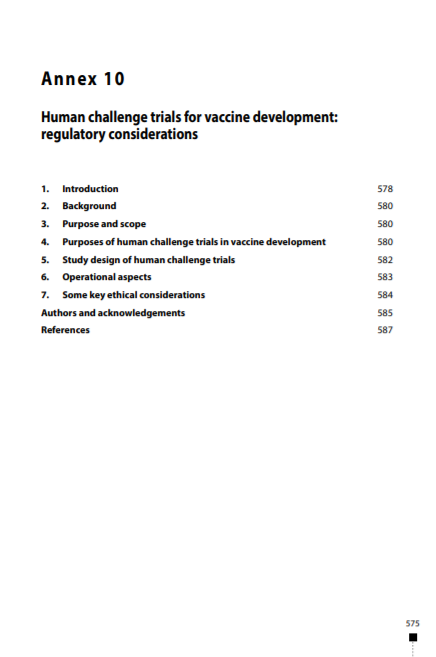Human challenge trials for vaccine development: regulatory considerations, Annex 10, TRS No 1004

Overview
Human challenge trials have been conducted over hundreds of years and have contributed vital scientific knowledge that has led to advances in the development of drugs and vaccines. Nevertheless, such research can appear to be in conflict with the guiding principle in medicine to do no harm. A number of well-documented historical examples of human exposure studies would be considered unethical by current standards. It is essential that challenge trials be conducted within an ethical framework in which truly informed consent is given. When conducted, human challenge trials should be undertaken with abundant forethought, caution and oversight. The value of the information to be gained should clearly justify the risks to human subjects. Although human challenge trials are not a required element of every vaccine development programme, there are many reasons why a developer may ask to conduct a “challenge-protection” study with humans, which might normally be conducted in animals. Human challenge trials may be safely and ethically performed in some cases, if properly designed and conducted. Considerable insight can then be gained into the mode of action and potential benefit of drugs and vaccines in humans.
This WHO guidance document on human challenge trials should be read in conjunction with the updated WHO Guidelines on clinical evaluation of vaccines: regulatory expectations (3) which were adopted, along with the current document, by the WHO Expert Committee on Biological Standardization in October 2016. . The document only covers issues specifically relevant to the design and conduct of clinical trials that enrol healthy adult humans capable of truly informed consent, and that involve the intentional exposure to, and potential infection with, an infectious disease organism. All other issues common to the design, conduct and evaluation (assessment) of vaccine clinical trials may be found in the updated WHO Guidelines on clinical evaluation of vaccines: regulatory expectations.
Full version of the WHO Technical Report Series N° 1004
